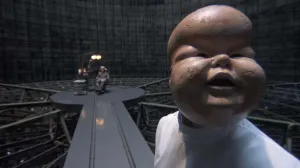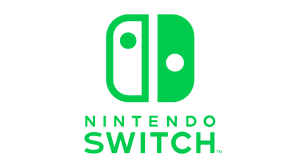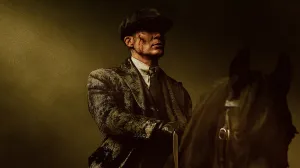DC’s Joker movie has been controversial ever since it was first announced. Now that the film is out, the conversation has moved into what the film actually is, and what message it actually conveys. For those that seem to embrace it, Joker is being hailed as everything from a timely parable about those society leaves behind, to a bold character study of one the most infamous villains ever created. For those that reject it, Joker is being slammed for its chilling take on mental illness, and/or its nihilistic thematic commentary on society. Even director Todd Phillips has come under fire, for expressing his socio-political views related to the film, in interviews with the press.
Videos by ComicBook.com
However, in all the media attention swirling around Joker, it’s ironic that one of the key thematic points of the film is also one of the only ones not being discussed in all the media attention coverage about it. Joker has quite a lot to say about society’s current obsession with media and content consumption – and in having the film penetrate the pop-culture zeitgeist as deeply as it has, Todd Phillips has told the ultimate viral joke. (MAJOR SPOILERS FOLLOW!)
*
A major part of Joker‘s storyline mostly unfolds as background noise in Arthur Fleck’s (Joaquin Phoenix) myopic world view: the dual media stories about the Clown Mask Killer, and Thomas Wayne’s campaign for Mayor. Phillips takes a several cues from both Frank Miller’s The Dark Knight Returns and Martin Scorsese’s The King of Comedy in forming Joker; the rise of round-the-clock news coverage was a major part of Miller’s Batman story, and in King of Comedy, society’s obsession with the cult of celebrity was a major thematic point. Joker mixes these two themes into the subplot of how Arthur’s violent outburst on the subway (murdering three Wall Street types) gets blown up into a story about class warfare – a story that’s never even accurate to begin with (Arthur commits the murders in clown makeup – not a mask).
The myth of the Clown Mask Killer and his mission grows in media coverage, even as Arthur is otherwise engaged with his own life happenings. It is eventually that same media attention that gets Arthur’s attention, and pushes him to believe that he is more than just a troubled loner: he’s the symbol of a movement, even if (as Arthur later confesses) he has no personal belief in that movement (timely socio-political message, hint, hint!). Arthur rides the wave of media attention all the way to the Murray Franklin show, where he uses a literal and figurative media stage to cement his infamous legacy. What’s perhaps most cynical about Joker is that Arthur’s plan works better than he ever could have hoped: His savage murders, amplified by the media, propel him beyond celebrity status to the level of cult-like reverence from his followers. Joker is only created because the media helps shape his myth, and spread his madness.
That same media myth about the Clown Mask Killer also drags down Thomas Wayne (a well-meaning political figure) into the crosshairs of public outrage. Wayne gets in trouble for an off-hand comment he makes about the Clown Mask Killer’s popularity with some of Gotham’s citizens (timely social-political message, hint, hint!), and that comment gets way overblown. Soon, Wayne’s “Clowns” comment inspires a radical uprising form the working class and/or disturbed citizens – one that starts as political protest, but quickly escalates into full-blown anarchy. Thomas Wayne becomes a demonized politician, and one violent creep (literally and figuratively masking himself as part of the people’s rebellion) slays Wayne and his wife in cold blood. And so, media sensation helps to create the Batman and Joker, alike.
Even social media gets knocked in Joker, via the storyline with Robert De Niro’s Murray Franklin. It stretches the logic of Joker‘s 1980s setting, but when Arthur bombs doing a stand-up set, a tape of his failed attempt makes it all the way to the desk of local celebrity Murray Franklin, who also happens to be Arthur’s idol (King of Comedy reference!). Murray invites Arthur on the late night talk show – but not to celebrate him. Murray is only holding Arthur up to knock him down again, after already taking a bad moment from Arthur’s life and making it a viral sensation for everyone to laugh at. Arthur ultimately turns the tables by using that social media attention to spark his own viral video craze: Murray Franklin’s murder on live TV. The joke is clear: there’s only so long we can revel in collective Schadenfreude before that karma comes back on us.
Phillips drives Joker‘s point about media home with a rare segment that breaks away from Arthur Fleck’s perspective, to an image of his assassination of Murray Franklin spreading across TV screens and media all over Gotham, growing and mutating into an all-out uprising that ultimately swallows the city (and Wayne family) up in a swirl of madness and violence. Arthur thinks his story is over and finished as he’s led away in a cop car, but thanks to the power and pervasiveness of media, he’s not in that car ten minutes before enraged clown-faced citizens break him loose, and ritualistically anoint him as a criminal icon.
…And therein lies the joke.
As some viewers critical of Joker have pointed out, this movie only wears the face of the DC comics character and Batman mythos like a mask – it could just have easily been a Taxi Driver-style character study, about a disturbed man’s downward spiral struggle with urban society. Joker has only gotten the attention it has because Joaquin Phoenix’s Arthur Fleck puts that face paint and Joker suit on; indeed, it’s arguable that Phillips is critical of the entire idea that The Joker is such a popular media figure, as this film clearly demonstrates how disturbing the character really is, when set in more grounded, real-world context (and without Batman). But once again, this Joker movie has become the pop-culture fixation of the moment, with all the profits that infamy brings. Unfortunately for Todd Phillips, his punchline may not have landed quite as expected.
If Joker is supposed to be an ironic joke about how a little savage grandstanding and media attention can turn a wacko into a celebrity icon, then the fact that such a discussion is pretty much absent from the social discourse about the film must be somewhat upsetting to the filmmaker (frustration that may be manifesting in press interviews). That Phillips himself has been demonized in the media (while actual crooks and madmen continue to be elevated by it), must be a personal hell wherein the joke-teller finds out the joke has actually been on him the whole time.
But then… that’s exactly the kind of sick joke The Joker would enjoy the most.
Joker is now in theaters. Upcoming DC Movies include Birds of Prey (and the Fantabulous Emancipation of One Harley Quinn) on February 7, 2020, Wonder Woman 1984 on June 5, 2020, The Batman on June 25, 2021, The Suicide Squad on August 6, 2021, and Aquaman 2 on December 16, 2020.








